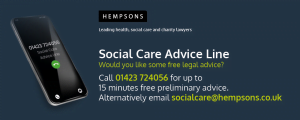The Fundamental Standards – Safeguarding
In this edition in our series of Fundamental Standards articles, we explore the Health and Social Act 2008 (Regulated Activates) 2014 regulation 13 – ‘Safeguarding service users from abuse and improper treatment’.
Service users must be protected from abuse and improper treatment
Systems and processes must be established and operated effectively to prevent abuse of service users
Systems and processes must be established and operated effectively to investigate allegations or evidence of abuse, immediately upon become aware
Safeguarding is a constant – everyone should be aware of their safeguarding responsibilities throughout the working day.
Do you have a safeguarding policy? Is it up to date?
Have all your staff read it?
Do they understand what abuse (of all kinds) might look and sound like and do they know what to do if they think they have seen or heard abuse?
Make sure that all your staff are trained in safeguarding and that you keep their training up-to-date. Make sure you have all certificates and records of training and can show the Local Authority and the CQC very easily the training that everyone has had and that there are no gaps.
Having the training is only one part of the equation though. Do staff truly understand what abuse or suspected abuse (of any kind), looks or sounds like? Remember that actual verbal abuse, or ignoring someone can be just as significant as a physical action and be on the look out for financial abuse too – where relatives might try to take over someone’s finances or appear to try and persuade them to buy big ticket items for them
Remember your reporting obligations on safeguarding. Refer to the CQC (Registration) Regulations 2009 and in particular regulation 18 – do you know when you do and don’t need to report an issue through to CQC?
Some services say that due to the nature of their client group, if they reported every example of suspected abuse, they would be reporting all day long! We recommend devising a process whereby you review internally and are clear on what cases you need to report and which you manage internally. This should feed into your internal processes anyway of reviewing incidents and any lessons learnt exercises you need to cover.
If CQC then come calling with a list of incidents which haven’t been reported, or perhaps that a whistleblower has come forward with, or have been reported to the Local Authority, you as a provider are then in a position where you can evidence your assessment and decision making process around why you didn’t report an altercation between two dementia residents but you did report when one of those residents tripped and fell.
One final point in safeguarding is your deprivation of liberty authorisations. Do make sure those are up-to-date and that you make timely applications to the Local Authority to renew them. Make sure you have the evidence in your files that referrals have gone through and you have chased the Local Authority where appropriate to ensure your residents are protected.
Safeguarding is about protecting everyone – your clients, your staff and you as a provider. Get it right first time.
For further advice or for bespoke Fundamental Standards Training, contact Philippa Doyle or contact the Hempsons Social Care Advice Line for 15 minutes free advice.

